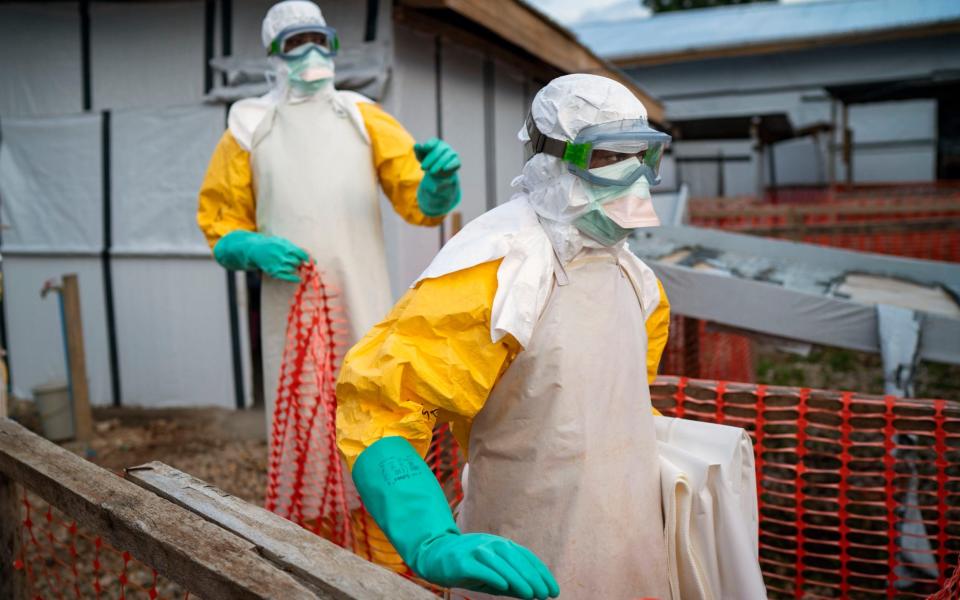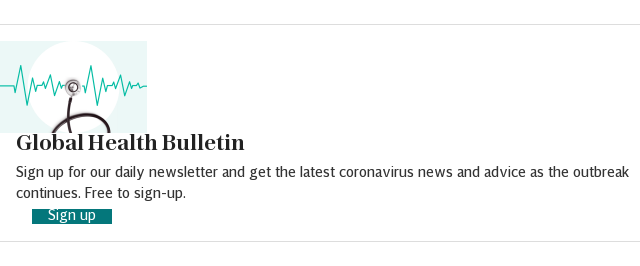Ebola declared an international emergency as disease spreads

The World Health Organization on Wednesday finally declared the Democratic Republic of Congo’s year-long Ebola outbreak an international health emergency, a rare designation only used for the gravest epidemics.
The decision will trigger more funding and attention to a crisis which has been largely ignored by the international community since it began last August.
Dr Tedros Adhanom Ghebreyesus, director general of the WHO, said: “It is time for the world to take notice and redouble our efforts. We need to work together in solidarity with the DRC to end this outbreak and build a better health system."
This is the fourth time WHO has called an emergency meeting in this outbreak, with the organisation previously reluctant to declare an emergency.
The decision comes after a case of the disease emerged in Goma, a city bordering Rwanda and with a population of nearly two million people. The patient, a pastor, has now died and the case sparked fears that the disease could run out of control in such a densely-packed urban area.

As the committee met on Wednesday it also emerged that the disease had surfaced again in Uganda where a Congolese woman traveled across the border to buy fish at a market on July 11 before returning to DRC where she died on July 15.
The disease has killed 1,676 people - more than two thirds of those who contracted it - over the past year. The 2013-2016 West African Ebola epidemic killed over 11,300 people.
Robert Steffen, chair of the emergency committee, said on Wednesday that the outbreak was a “regional emergency but by no way a global threat”.
Dr Tedros said that it was important that neighbouring countries did not close their borders as this would have a negative impact on travel and trade.
“Now is the time for the international community to stand in solidarity with the people of DRC, not to impose punitive and counter-productive restrictions,” he said.
He added: "Such restrictions force people to use informal and unmonitored crossings, increasing the potential for spread of the disease.”

Since the outbreak was declared Ebola has been largely confined to the North Kivu region of the country, although there were three cases of the disease in Uganda last month.
Ebola is highly infectious and it spreads through contact with bodily fluids. There have been 2,489 cases of the disease, including 1,665 deaths, making it the largest outbreak the DRC - where the virus was first identified in 1976 - has ever faced.
The outbreak is proving particularly tenacious because of the high levels of violence in the area linked to ethnic and tribal tensions, preventing health workers getting out into the field.
Ebola health workers have also come under attack and an epidemiologist working for WHO was killed in April. This is the first time the region has witnessed Ebola and authorities have struggled to gain the trust of communities, who are suspicious of the sudden influx of international aid workers.
Experts hope that declaring an international health emergency will bring more attention to the outbreak which, up to now, has largely been ignored by the global community.
The UK and United States governments have been generous - the UK has given £37.7m and has pledged a further £50m - but international development secretary Rory Stewart earlier this week urged "dear friends" in the G7 group of richest nations to step up and do more.
The WHO has less than half the $98.4m it required for the period February to July, receiving just $43.6m. Dr Tedros said that the organisation was finalising its budget for tackling the outbreak beyond this month which would probably run into hundreds of millions of dollars.

There are no direct flights between the UK and DRC and the risk in the UK is seen as very low.
Benoit Munsch, country director for Care International, told The Telegraph that there were fears in Goma about the spread of the disease but authorities had made preparations such as increasing surveillance and raising awareness.
Speaking to the Telegraph before the WHO committee met, he said a declaration of an international emergency would bring more much needed resources to the front line. But he added it could also lead to countries closing their borders with DRC.
"There is a huge amount of travel between Rwanda, Uganda and DRC. An international emergency could have a huge impact on people crossing the border and on trade and people's livelihoods," he said.
Professor Peter Piot, director of the London School of Hygiene & Tropical Medicine and a member of the team who discovered Ebola, welcomed the decision to declare an international emergency.
"I hope that today’s decision serves as a wake-up call to drive high-level political action, improved coordination, and greater funding to support DRC in their efforts to stop this devastating epidemic,” he said.
Médecins Sans Frontières president Joanne Liu said the community must be at the heart of the response: “The epidemic is not under control and we need a change of gear, but this should not be about movement restrictions or the use of coercion on the affected population. Communities and patients need to be at the centre of the response, they need to be active participants.”

Dr Josie Golding, epidemics lead at Wellcome said, "This is perhaps the most complicated epidemic the world has ever had to face, yet still the response in the DRC remains overstretched and underfunded. The calling of an international emergency is an opportunity for a change in the response to help stop Ebola spreading and save lives. At step-up in the response, led by the DRC and with full international support, is critical if we are to bring the epidemic to an end."
Mark Eccleston-Turner, an expert in global health law at Keele University, said the declaration of an emergency does not specify a surge in financing but can act a clarion call to galvanise high-level political and financial support.
"What is crucial now, is how governments and aid agencies respond to this declaration – WHO needs to be given the tools to bring this outbreak under control. This will certainly involve a large increase in financial assistance from member states, as well as collaborating with other UN agencies," he said.
Protect yourself and your family by learning more about Global Health Security

 Yahoo News
Yahoo News 